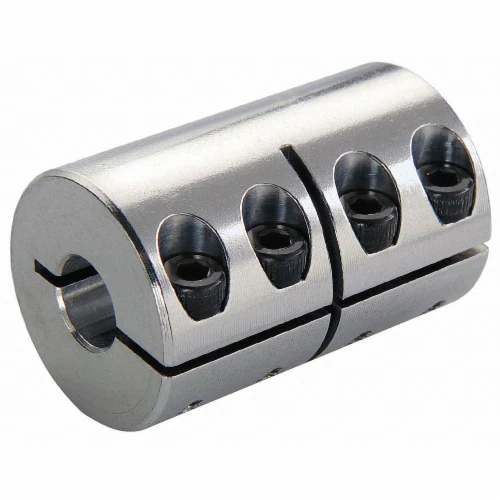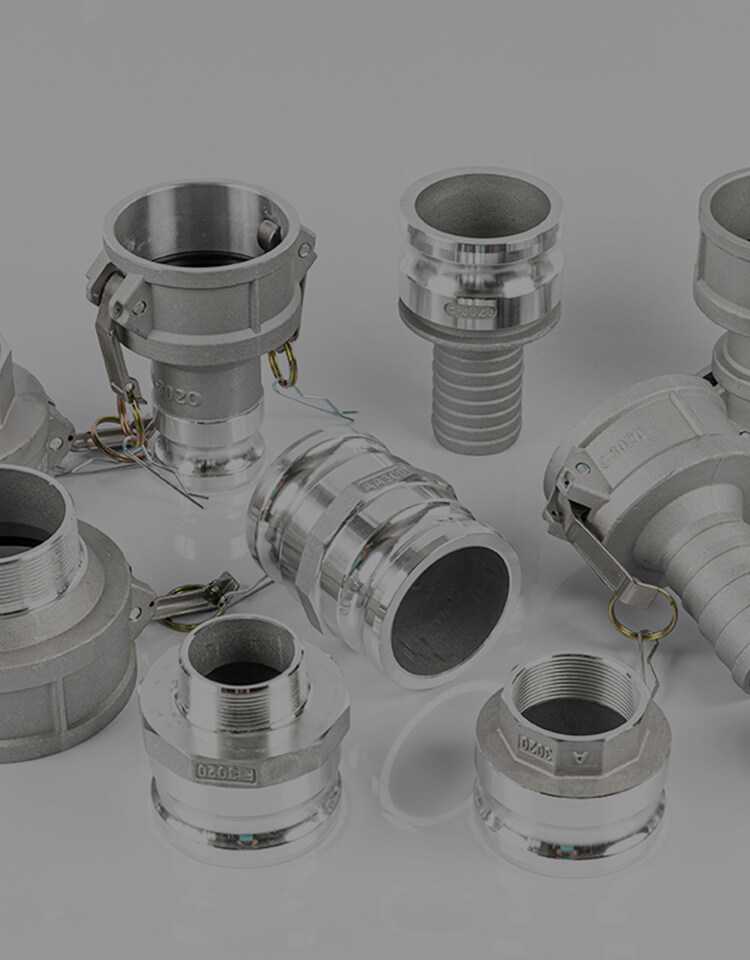Erreur de format d'e-mail
emailCannotEmpty
emailDoesExist
pwdLetterLimtTip
inconsistentPwd
pwdLetterLimtTip
inconsistentPwd

Nouvelles
Ici, vous pouvez décrire un morceau de texte que vous souhaitez exprimer

Navigating the World of Wholesale CNC Shaft Coupler Solutions
The CNC shaft coupler is an unsung hero, playing a pivotal role in connecting rotating shafts and transmitting power with precision in the dynamic field of mechanical engineering and machine assembly. For businesses and manufacturers, sourcing these components at scale is a critical task, and the wholesale CNC shaft coupler market offers a plethora of options to meet diverse industrial needs. This comprehensive blog post will guide you through the intricacies of wholesale CNC shaft couplers, their applications, and how to make informed purchasing decisions.
Understanding CNC Shaft Couplers:
CNC (Computer Numerical Control) shaft couplers are meticulously engineered components designed to join two shafts within a motor or drive system, allowing for the transfer of motion and torque. These couplers compensate for misalignment, absorb shocks, and mitigate vibration, ensuring the longevity and efficiency of the machinery they serve.
The Significance of Wholesale CNC Shaft Coupler Procurement:
For businesses that require a steady supply of CNC shaft couplers, engaging in wholesale procurement is a strategic move. It not only ensures a consistent inventory but also leverages economies of scale, resulting in cost savings and streamlined supply chain management.
Diverse Applications of CNC Shaft Couplers:
CNC (Computer Numerical Control) shaft couplers are mechanical components used to connect two shafts together at their ends for the purpose of transmitting power. They are designed to accommodate misalignment, reduce transmission of shock loads, and provide some degree of compliance or flexibility while maintaining the transmission of torque. Due to their precision and reliability, CNC shaft couplers find applications in various industries and for different purposes. Here are some diverse applications:
Manufacturing Equipment: CNC shaft couplers are commonly used in automated manufacturing equipment such as milling machines, lathes, and grinders. They ensure precise alignment and smooth transmission of motion from motors to lead screws or spindles.
Robotics: In robotics, shaft couplers are used to connect the motors to the joints or wheels. They must accommodate misalignments and variations in motion while maintaining accuracy and repeatability.
Medical Devices: High-precision CNC shaft couplers are used in medical equipment such as MRI machines, CT scanners, and X-ray machines. They ensure smooth and accurate operation, which is critical for patient safety and the quality of diagnostic images.
Aerospace: In the aerospace industry, shaft couplers are used in actuators, control systems, and satellite components. They must withstand extreme temperatures, vibrations, and other harsh conditions while maintaining precise alignment and function.
Automotive: CNC shaft couplers are used in various automotive applications, including steering systems, drive trains, and test equipment. They need to be durable and capable of handling the dynamic loads and misalignments typical in automotive environments.
Energy: In wind turbines and other renewable energy systems, shaft couplers connect the turbine blades to the generators. They must be robust enough to handle the variable loads and environmental conditions.
Printing and Packaging: High-speed printing and packaging machines use CNC shaft couplers to ensure precise timing and alignment between rollers, conveyors, and other moving parts.
CNC Machinery: In CNC routers, plasma cutters, and 3D printers, shaft couplers are used to connect stepper or servo motors to the drive mechanisms that move the tool head or build platform.
Research and Development: In R&D labs, precision couplers are used in experimental setups, test rigs, and prototyping machines where accuracy and repeatability are crucial.
Marine: In boats and ships, shaft couplers are used in propulsion systems to connect the engine to the propeller shaft. They must resist corrosion and handle the alignment changes due to the movement of the vessel.
Food and Beverage: In food processing and packaging machinery, shaft couplers must be made of materials that are safe for food contact and easy to clean, while still providing reliable power transmission.
Textile Industry: Textile machines use shaft couplers to ensure synchronized operation of rollers and spindles for consistent fabric production.
Selecting the Right Wholesale CNC Shaft Coupler:
When it comes to selecting the right wholesale CNC shaft coupler, several factors come into play. These include the type of coupling required, the materials used, the torque capacity, and the level of precision needed. It’s essential to match the coupler’s specifications with the application’s demands to ensure optimal performance.
Types of CNC Shaft Couplers:
There are multiple types of CNC shaft couplers available in the wholesale market, each serving a specific purpose:
Rigid Couplers:
These couplers are ideal for applications where shaft alignment is perfect, and no flexibility is required. They are simple in design and offer a direct connection between two shafts.
Flexible Couplers:
Flexible couplers are designed to accommodate misalignment and end movement, making them suitable for applications where precision alignment is challenging.
Bellows Couplers:
Known for their high precision and flexibility, bellows couplers can compensate for axial, lateral, and angular misalignments. They are commonly used in servo-driven systems.
Jaw Couplers:
Jaw couplers provide a balance between flexibility and torque capacity, with elastomeric elements that absorb vibrations and shocks.
Material Considerations for CNC Shaft Couplers:
The material of a CNC shaft coupler affects its performance, durability, and suitability for specific environments. Common materials include aluminum, stainless steel, and engineered plastics. Each material offers distinct advantages, such as corrosion resistance, strength-to-weight ratio, and cost-effectiveness.
Wholesale Sourcing Strategies:
When sourcing wholesale CNC shaft couplers, businesses should employ a strategic approach to ensure they receive high-quality components at competitive prices while maintaining a reliable supply chain. Here are some detailed strategies for sourcing wholesale CNC shaft couplers:
Identify Your Requirements: Clearly define the specifications of the CNC shaft couplers you need, including size, torque capacity, material, and any other technical requirements. This will help you communicate effectively with suppliers and ensure you receive products that meet your needs.
Research Potential Suppliers: Look for suppliers who specialize in CNC components and have a good reputation in the industry. Check their credentials, certifications (such as ISO), and customer reviews. Attend trade shows, use B2B marketplaces, and consult industry directories to find potential suppliers.
Evaluate Supplier Capabilities: Assess the supplier’s manufacturing capabilities, quality control processes, and capacity to handle your volume requirements. Ensure they have a robust quality management system in place and can provide products that meet industry standards.
Request Samples: Before placing a large order, request samples to evaluate the quality of the CNC shaft couplers. This will also give you an opportunity to test the components in your specific application.
Negotiate Pricing and Terms: Once you have identified suppliers that meet your quality standards, negotiate pricing, payment terms, and delivery schedules. Consider asking for volume discounts or tiered pricing based on order quantity.
Establish Long-Term Relationships: Building long-term relationships with suppliers can lead to better service, priority treatment, and more favorable terms. Consistent business can also encourage suppliers to invest in understanding your specific needs and possibly offer customized solutions.
Diversify Your Supplier Base: While it’s beneficial to have close relationships with key suppliers, it’s also wise to diversify your supplier base to mitigate risks. Having multiple suppliers can protect your business from supply chain disruptions.
Monitor Supplier Performance: Keep track of delivery times, product quality, and responsiveness to communication. Regular performance reviews can help ensure that suppliers continue to meet your expectations and allow you to address any issues promptly.
Consider Total Cost of Ownership (TCO): When evaluating suppliers, consider the total cost of ownership, which includes not just the unit price of the couplers but also shipping costs, potential import duties, lead times, and the cost of any delays or quality issues.
Leverage Technology: Utilize supply chain management software to streamline your sourcing process, track inventory levels, and manage orders. This can help you make data-driven decisions and improve efficiency.
Stay Informed About Market Trends: Keep abreast of market trends, material costs, and technological advancements that may affect the availability or pricing of CNC shaft couplers.
Sustainability and Compliance: Ensure that your suppliers comply with environmental regulations and labor laws. Partnering with suppliers that prioritize sustainability can also align with your company’s corporate social responsibility goals.
Quality Assurance in Wholesale CNC Shaft Couplers:
Quality is paramount when purchasing CNC shaft couplers in bulk. Look for suppliers who adhere to stringent quality control standards and who can provide certification and testing documentation to verify the couplers’ performance.
Integration with Other Coupling Solutions:
In some cases, CNC shaft couplers need to be integrated with other types of couplings, such as wholesale casing coupling for piping systems or water supply line couplers. Ensuring compatibility and seamless integration is essential for the success of the overall system.
The Role of Viscous Couplings:
While exploring coupling solutions, it’s worth noting the role of viscous couplings, which use a fluid to transmit torque. Viscous coupling manufacturers offer specialized components that provide smooth power transmission in applications where variable torque is required.
Conclusion:
The world of wholesale CNC shaft couplers is vast and varied, offering solutions for a wide array of industrial applications. By understanding the different types of couplers, material options, and sourcing strategies, businesses can make informed decisions that contribute to the efficiency and reliability of their machinery. Whether you’re in the market for a viscous coupler for sale or seeking a water supply coupling nut, the key is to prioritize quality, compatibility, and a strong partnership with a reputable supplier. With these considerations in mind, navigating the wholesale CNC shaft coupler market becomes a strategic endeavor that can lead to significant benefits for your business.

